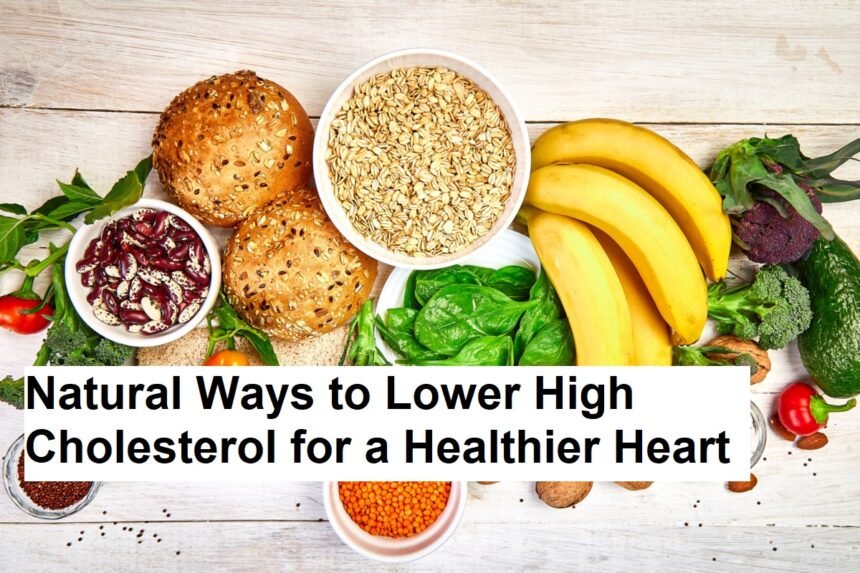Introduction
High cholesterol is one of the most common health challenges people face today. While cholesterol itself isn’t bad—our body actually needs it—too much of the wrong kind can increase the risk of heart disease, stroke, and other serious conditions. The good news? You don’t always need medication right away. By adopting natural strategies, you can support healthy cholesterol levels and protect your heart health for the long term.
This article will walk you through practical ways to lower cholesterol, from simple diet changes to lifestyle habits that make a big difference.
Understanding Cholesterol
What is Cholesterol?
Cholesterol is a waxy substance found in your blood. Your body uses it to build cells, hormones, and vitamins. However, when cholesterol levels get too high, fatty deposits can build up in your arteries, making it harder for blood to flow.
Good vs. Bad Cholesterol
- LDL (Low-Density Lipoprotein): Often called “bad cholesterol” because high levels can clog arteries.
- HDL (High-Density Lipoprotein): Known as “good cholesterol” because it helps remove LDL from the bloodstream.
The goal is not to eliminate cholesterol, but to keep it in balance and maintain healthy cholesterol levels.
Why Lowering Cholesterol Matters
High cholesterol often has no symptoms, but silently damages your health over time. Managing it naturally helps reduce risks of:
- Heart disease
- Stroke
- High blood pressure
- Poor circulation
Taking steps to lower cholesterol early is one of the best investments in your heart health.
Practical Ways to Lower Cholesterol Naturally
1. Choose Cholesterol-Lowering Foods
Your diet is the first place to start when it comes to lowering cholesterol naturally.
Best foods for cholesterol control include:
- Oats & whole grains: High in soluble fiber, which helps remove LDL from the body.
- Nuts (almonds, walnuts): Rich in healthy fats that raise HDL and lower LDL.
- Fatty fish (salmon, mackerel, sardines): Packed with omega-3s for better heart health.
- Avocados: A great source of monounsaturated fats to promote healthy cholesterol.
- Beans & lentils: Provide plant-based protein and fiber.
2. Cut Back on Unhealthy Fats
Not all fats are bad, but too much saturated and trans fats raise LDL cholesterol. Limit foods like:
- Fried snacks
- Processed meats
- Packaged baked goods
Instead, cook with olive oil, coconut oil (in moderation), or avocado oil.
3. Maintain a Healthy Weight
Even a small weight loss—just 5 to 10% of your body weight—can significantly lower LDL cholesterol. Pairing a balanced diet with daily activity is the best natural way to lower cholesterol.
4. Exercise Regularly
Physical activity helps boost HDL (the “good cholesterol”) and improves overall heart health.
Simple activities that help:
- Brisk walking for 30 minutes a day
- Cycling or swimming
- Yoga or pilates for flexibility and balance
- Strength training to support metabolism
The key is consistency rather than intensity—just keep moving daily.
5. Eat More Fiber
Fiber is your friend when it comes to cholesterol. Soluble fiber in particular binds with LDL and helps remove it from the body.
High-fiber foods:
- Apples and pears
- Carrots
- Barley
- Beans
- Chia seeds and flaxseeds
Adding these into your meals is a natural, simple way to lower cholesterol.
6. Avoid Smoking and Limit Alcohol
- Smoking lowers HDL and damages blood vessels, making cholesterol build-up more dangerous. Quitting improves heart health almost immediately.
- Alcohol in moderation (like a small glass of red wine) may boost HDL, but too much raises LDL and triglycerides. Balance is key.
7. Manage Stress Levels
Chronic stress can indirectly raise cholesterol by increasing unhealthy habits like overeating or smoking. Incorporating relaxation methods such as meditation, breathing exercises, or mindfulness supports both mental well-being and healthy cholesterol.
Natural Supplements That May Help
Some people also benefit from natural supplements to support cholesterol health, but always consult a doctor before trying them. Options include:
- Omega-3 fatty acids (fish oil)
- Plant sterols
- Psyllium husk (fiber supplement)
- Green tea extract
Creating a Daily Routine for Heart Health
Morning
- Start your day with oatmeal topped with chia seeds.
- Take a short walk or stretch for 10 minutes.
Afternoon
- Snack on a handful of almonds or walnuts.
- Replace sugary drinks with green tea or water.
Evening
- Prepare a dinner with fatty fish and steamed vegetables.
- Take a 20-minute walk after your meal.
Small changes add up over time, leading to long-term improvements in cholesterol and heart health.
Common Mistakes to Avoid
- Thinking medication is the only solution
- Eating “low-fat” packaged foods (often high in sugar)
- Skipping exercise because of a busy schedule
- Ignoring regular check-ups
Remember, lifestyle adjustments are powerful when it comes to lowering cholesterol naturally.
Conclusion
High cholesterol doesn’t have to control your future. By eating cholesterol-lowering foods, maintaining an active lifestyle, and focusing on heart health, you can naturally balance your cholesterol levels. The key lies in daily choices—what you eat, how much you move, and how well you care for your body.
Ready to take charge of your health? Start by adding one cholesterol-lowering food to your meals today, go for a short walk, and share your journey in the comments below. Your small steps can inspire others to embrace a heart-healthy lifestyle too!












